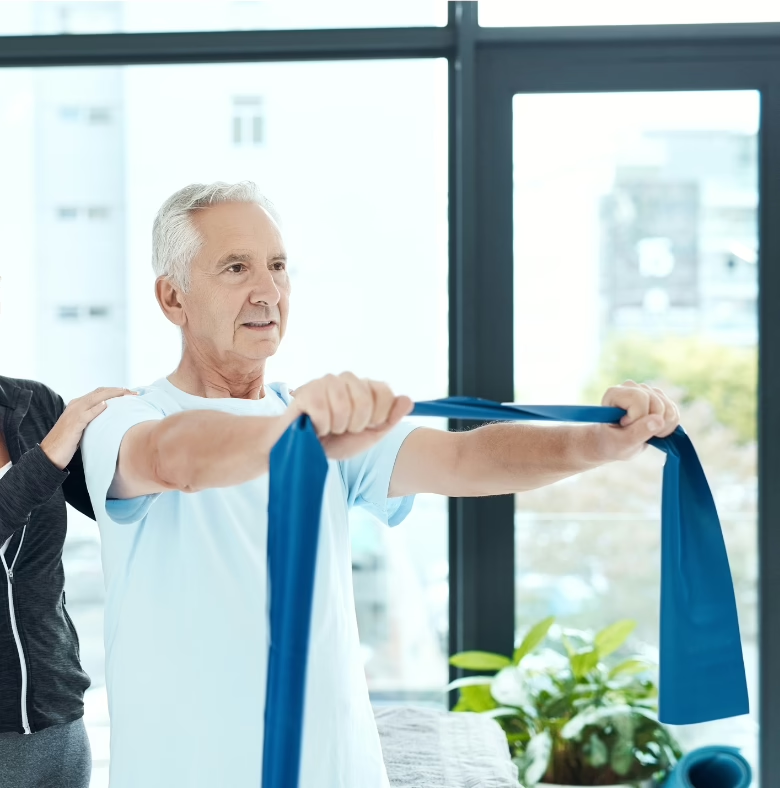How to Fix Bad Posture: Key Muscle Groups and How to Train Them
Bad posture is more than just a cosmetic issue. Over time, poor alignment can lead to chronic pain, reduced mobility, and even injury. The good news is that with the right exercises and guidance, posture can be improved—sometimes dramatically. At The Summit, a private personal training studio with locations in Washington Square and Rittenhouse Square in Philadelphia, we specialize in helping clients move better and feel stronger by addressing the root causes of poor posture. If you’re searching for effective exercises for posture or looking for a knowledgeable personal trainer in
Mobility Training: How The Summit Builds Better Movement at Every Age
Mobility is more than just the ability to move—it's the foundation of independence, vitality, and overall well-being. Whether you're walking up stairs, getting out of a car, or simply bending to tie your shoes, mobility plays a central role in everyday life. At The Summit, a leading personal training studio in Philadelphia, mobility is a key focus for all clients—especially seniors looking to maintain independence and reduce the risk of injury as they age. What Is Mobility and Why Does It Matter? Mobility refers to the ability of a joint to
Frailty vs. Obesity: Why Frailty is More Dangerous as You Age and How Personal Trainers Can Help
As we age, our bodies undergo a series of changes that affect our strength, balance, and overall health. While many are familiar with the risks associated with obesity—such as diabetes, heart disease, and joint problems—there is another growing concern that has become more prevalent in aging populations: frailty. In fact, frailty is often more dangerous than obesity as we grow older. However, personal trainers play a crucial role in fighting frailty and promoting healthier aging. Let’s dive deeper into why frailty is such a serious concern, how it differs from
7 Reasons Why Women Experiencing Menopause Should Hire a Personal Trainer
Menopause marks a significant transition in a woman’s life — physically, emotionally, and mentally. While it's a natural biological process, the symptoms that accompany menopause, like weight gain, hot flashes, mood swings, sleep disturbances, and a loss of muscle and bone density, can feel anything but natural. Fortunately, regular exercise can help manage and even reduce many of these symptoms — and working with a personal trainer can make all the difference. Here’s why a personal trainer can be a powerful ally during menopause: 1. Tailored Workouts for Your Changing Body Hormonal changes
Ozempic and Muscle Loss: How Strength Training Can Help Fight Frailty
In recent years, Ozempic (semaglutide) has gained widespread attention as a revolutionary medication for managing type 2 diabetes and aiding in weight loss. While it offers significant benefits, especially for those struggling with obesity, there’s an important consideration that many are unaware of: Ozempic can contribute to muscle loss, which may lead to frailty as you age. In this article, we’ll explore how Ozempic’s potential impact on muscle mass can lead to frailty and how a strength training program with a personal trainer can be a crucial part of preventing
Why Private Training is the Smartest Way to Reach Your Fitness Goals
If you're serious about your health and wellness, there's a better way to train. At The Summit, we believe that reaching your fitness goals isn’t just about showing up to the gym—it’s about doing the right work with the right guidance. That’s where private fitness comes in. Whether you're looking to lose fat, gain muscle, recover from injury, or just feel more energized in your day-to-day life, working with a private trainer is the most efficient and personalized path forward. With boutique gym locations in Rittenhouse Square and Washington Square, we specialize
Can a Personal Trainer Help Prevent or Reverse Heart Disease?
Everyone knows that a having a personal trainer or just exercising in general, can help you look good and slim down for swimsuit weather. However, did you know a personal trainer can also help prevent or even reverse heart disease? The Heart Is a Muscle, Too! It’s important to note that the heart is a muscle, too! So just like the muscles of your arms, if your heart is not continuously used and challenged, it will weaken and atrophy. When exercised, the heart pumps more blood through the body and works at






